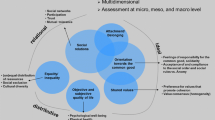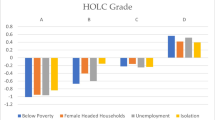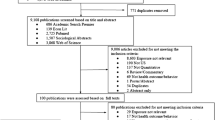Abstract
This study examines the state of sense of community, neighboring behavior, and social capital in the People’s Republic of China, and explores their ability to predict local political participation, in the form of voting in elections for Urban Resident/Rural Villager Committees. Using a nationally representative survey, rural, older and married residents and those with a primary or high school education and higher perceived socio-economic status are more likely to participate. In rural areas, men are more likely than women to vote. For urban residents, knowing one’s neighbors is more important whereas in rural areas, neighboring behavior is more important, but both predict voting. Social capital does not generally predict Chinese people’s local political participation. Western definitions of social capital derived from theories about networking, bonding and bridging ties may be too culturally individualistic for China, whose collectivist society and agrarian kinship networks predate Communism. Simply knowing and helping one’s neighbors, rather than more abstract notions of trust, reciprocity or membership, may lead to the development of local democracy.
Similar content being viewed by others
Notes
Sometimes called Urban Neighborhood Committee and Rural Village Committee; we will use these interchangeably.
References
Abatena, H. (1997). The significance of planned community participation in problem solving and developing a viable community capability. Journal of Community Practice, 4(2), 13–34.
Bian, Y. (1997). Bringing strong ties back in: Indirect ties, network bridges, and job searches in China. American Sociological Review, 62(3), 366–385.
Bian, Y. (2001). Guanxi capital and social eating in Chinese cities: Theoretical models and empirical analyses. In N. Lin, K. Cook, & R. S. Burt (Eds.), Social capital: Theory and research. New Jersey: Aldine Transaction.
Blanchet, K. (2001). Participatory development: Between hopes and reality. International Social Science Journal, 53(170), 637–641.
Bray, D. (2006). Building ‘community’: New strategies of governance in urban China. Economy and Society, 35(4), 530–549.
Brodsky, A. E., O’Campo, P. J., & Aronson, R. E. (1999). PSOC in community context: Multi-level correlates of a measure of psychological sense of community in low-income urban neighborhoods. Journal of Community Psychology, 27, 659–679.
Burns, J. (1988). Political participation in rural China. California: University of California Press.
Cai, F. (2000). China migrating population. Henan, China: Henan Renmin Press. (in Chinese).
Colombo, M., Mosso, C., & DePiccoli, N. (2001). Sense of community and participation in urban contexts. Journal of Community and Applied Social Psychology, 11, 457–464.
Foley, P., & Martin, S. (2000). A new deal for the community? Public participation in regeneration and local service delivery. Policy & Politics, 28(4), 479–491.
Garcia, I., Giuliani, F., & Wiesenfeld, E. (1999). Community and sense of community: The case of an urban barrio in Caracas. Journal of Community Psychology, 27(6), 727–740.
Ge, D. (2008). Building a harmonious community: Public services, social integration and expression of residents’ views: A study of cases from Ningbo, Dalian and Beijing. Social Sciences in China, 29(1), 160–170.
Gonzalez, J. L. (1998). Development sustainability through community participation: Mixed results from the Philippine health sector. Burlington, VT: Ashgate Publishing.
Guan, X. (2000). China’s social policy: Reform and development in the context of marketization and globalization. Social Policy and Administration, 34(1), 115–130.
Guan, X., & Chow, J. (2003/2004). The development of urban community services in China. Social Development Issues, 25(3), 51–61.
Gui, Y., & Huang, R. (2006). Is urban community “Gemeinschaft” or neighborhood? Journal of Huazhong Normal University (Humanities and Social Science)(China), 45(6), 36–42 (in Chinese).
Gui, Y., Huang, R., Li, J., & Yuan, J. (2003). The direct election: Social capital utilization or democracy promotion by authority? Journal of Shanghai Polytechnic College of Urban Management (China), 2003(6), 22–25 (in Chinese).
Henn, M., Weinstein, M., & Forrest, S. (2005). Uninterested youth? Young people’s attitudes towards party politics in Britain. Political Studies, 53(3), 556–578.
Hong Kong University of Science & Technology. (2004). Chinese general social survey (China GSS). Hong Kong University of Science & Technology Survey Research Center, Retrieved in March 8, 2008 at http://www.ust.hk/~websosc/survey/GSS_e.html.
Hughey, J., & Speer, P. W. (2002). Community, sense of community, and networks. In A. T. Fisher, C. C. Sonn, & B. J. Bishop (Eds.), Psychological sense of community: Research, applications, and implications (pp. 69–84). New York: Kluwer Academic/Plenum.
Jennings, M. K. (1997). Political participation in the Chinese countryside. American Political Science Review, 91(2), 361–372.
Jennings, J. (2004). Urban planning, community participation, and the Roxbury Master Plan in Boston. The Annals of the American Academy of Political and Social Science, 594, 12–33.
Jewkes, R., & Murcott, A. (1996). Meanings of community. Social Science and Medicine, 43(4), 555–563.
Jones, P. S. (2003). Urban regeneration’s poisoned Chalice: Is there an impasse in (community) participation-based policy? Urban Studies, 40(3), 581–602.
Jones, J. F., & Xu, Q. (2002). Grass-roots organization and community development: Evaluating the Chinese urban neighbourhood committee. Regional Development Studies, 8, 99–117.
Kingston, S., Mitchell, R., Florin, P., & Stevenson, J. (1999). Sense of community in neighborhoods as a multi-level construct. Journal of Community Psychology, 27(6), 681–694.
Krishna, A. (2002). Enhancing political participation in democracies: What is the role of social capital? Comparative Political Studies, 35(4), 437–460.
Li, W. (2006). Community decision-making: Participation in development. Annals of Tourism Research, 33(1), 132–143.
Li, Y., Lai, K., & Feng, X. (2007). The problem of ‘Guanxi’ for actualizing community tourism: A case study of relationship networking in China. Tourism Geographies, 9(2), 115–138.
Liu, L. (2008). To have and to be: Towards the social representation of quality of life in China. Journal of Community & Applied Social Psychology, 18, 233–252.
Liu, A. Q., & Besser, T. (2003). Social capital and participation in community improvement activities by elderly residents in small towns and rural communities. Rural Sociology, 68(3), 343–365.
Long, D. A., & Perkins, D. D. (2003). Confirmatory factor analysis of the sense of community index and development of a brief SCI. Journal of Community Psychology, 31(3), 279–296.
Luo, Y. (2007). The sense of community in modern city: The social constructivist perspective. Journal of Beijing University of Technology (Social Sciences Edition), 7(2), 17–21 (in Chinese).
Mallee, H. (2000). Migration, hukou and resistance in reform China. In E. J. Perry & M. Selden (Eds.), Chinese society: Change, conflict, and resistance (pp. 83–101). New York: Routledge.
Mancini, J. A., Martin, J. A., & Bowen, G. L. (2003). Community capacity. In T. Gullotta & M. Bloom (Eds.), Encyclopedia of primary prevention and health promotion. New York: Kluwer Academic/Plenum.
Manzo, L. C., & Perkins, D. D. (2006). Finding common ground: The importance of place attachment to community participation and planning. Journal of Planning Literature, 20(4), 335–350.
McConnell, C. (1993). Community development. Community Development Journal, 28(4), 289–292.
McMillian, D. W., & Chavis, D. M. (1986). Sense of community: A definition and theory. Journal of Community Psychology, 14(1), 6–23.
Midgley, J., Hall, A., Hardiman, M., & Narine, D. (1986). Community participation, social development and the state. London: Methuen.
Murthy, R. K., & Klugman, B. (2004). Service accountability and community participation in the context of health sector reforms in Asia: Implications for sexual and reproductive health services. Health Policy and Planning, 19(Suppl. 1), 78–86.
O’Brien, K. J., & Li, L. (2000). Accommodating “democracy” in one-party state: Introducing village elections in China. The China Quarterly, 162, 465–489.
Ohmer, M. (2007). Citizen participation in neighborhood organizations and its relationship to volunteers’ self- and collective efficacy and sense of community. Social Work Research, 31(2), 109–120.
Perkins, D. D., Brown, B. B., & Taylor, R. B. (1996). The ecology of empowerment: Predicting participation in community organizations. Journal of Social Issues, 52(1), 85–110.
Perkins, D. D., Hughey, J., & Speer, P. W. (2002). Community psychology perspectives on social capital theory and community development practice. Journal of the Community Development Society, 33(1), 33–52.
Perkins, D. D., & Long, D. A. (2002). Neighborhood sense of community and social capital: A multi-level analysis. In A. T. Fisher, C. C. Sonn, & B. J. Bishop (Eds.), Psychological sense of community: Research, applications, and implications. New York: Plenum.
Peterson, N. A., Speer, P. W., & McMillan, D. W. (2008). Validation of a brief sense of community scale: Confirmation of the principal theory of sense of community. Journal of Community Psychology, 36(1), 61–73.
Pooley, J. A., Cohen, L., & Pike, L. T. (2005). Can sense of community inform social capital? The Social Science Journal, 42, 71–79.
Prezza, M., Amici, M., Roberti, T., & Tedeschi, G. (2001). Sense of community referred to the whole town: Its relations with neighboring, loneliness, life satisfaction, and area of residence. Journal of Community Psychology, 29(1), 29–52.
Putnam, R. D. (2000). Bowling alone: The collapse and revival of American community. New York: Simon & Schuster.
Putnam, R., Leonardi, R., & Nanetti, R. (1993). Making democracy work: Civic traditions in modern Italy. Princeton, NJ: Princeton University Press.
Rahn, W. M., & Transue, J. E. (1998). Social trust and value change: The decline of social capital in American youth, 1976–1995. Political Psychology, 19(3), 545–565.
Ruf, G. A. (1998). Cadres and kin: Making a socialist village in West China, 1921–1991. Stanford, CA: Stanford University Press.
Sampson, R. J., Raudenbush, S. W., & Earls, F. (1997). Neighborhoods and violent crime: A multi-level study of collective efficacy. Science, 277, 918–924.
Sun, X., Xu, Z., Tao, T., & Su, F. (2007). Impacts of political trust and social capital on villagers’ committee election participation in China. Sociological Studies, 22(4), 165–187 (in Chinese).
Xia, J. (2008). An empirical study on self-governing organizations in new-style urban communities. Social Sciences in China, 29(1), 171–180.
Xu, Y. (2008). Introduction to special issue: Community studies and social construction in china. Social Sciences in China, 29(1), 129–131.
Xu, Q., & Chow, J. (2006). Urban community in China: Service, participation, and development. International Journal of Social Welfare, 15(3), 198–208.
Yan, M. C., & Gao, J. G. (2007). Social engineering of community building: Examination of policy process and characteristics of community construction in China. Community Development Journal, 42(2), 222–236.
Yip, W., Subramanian, S. V., Mitchell, A. D., Lee, D. T. S., Wang, J., & Kawachi, I. (2007). Does social capital enhance health and well-being? Evidence from rural China. Social Science and Medicine, 64, 35–49.
Yuen Tsang, A. W. K. (1999). Chinese communal support networks. International Social Work, 42(3), 359–372.
Zhang, J. (1992). Gender and political participation in rural China. In S. Rai, H. Pilkington, & A. Phizacklea (Eds.), Women in the face of change: Soviet Union, Eastern Europe and China (pp. 41–56). London: Routledge.
Zhang, X., Fan, S., Zhang, L., & Huang, J. (2004). Local governance and public goods provision in rural China. Journal of Public Economics, 88, 2857–2871.
Zhang, L., Wang, H., Wang, L., & Hsiao, W. (2006). Social capital and farmer’s willingness-to-join a newly established community-based health insurance in rural China. Health Policy, 76, 233–242.
Zhong, Y., & Chen, J. (2002). To vote or not to vote: An analysis of peasants’ participation in Chinese village elections. Comparative Political Studies, 35(6), 686–712.
Author information
Authors and Affiliations
Corresponding author
Rights and permissions
About this article
Cite this article
Xu, Q., Perkins, D.D. & Chow, J.CC. Sense of Community, Neighboring, and Social Capital as Predictors of Local Political Participation in China. Am J Community Psychol 45, 259–271 (2010). https://doi.org/10.1007/s10464-010-9312-2
Published:
Issue Date:
DOI: https://doi.org/10.1007/s10464-010-9312-2




